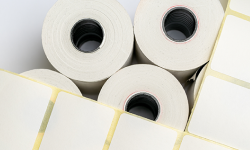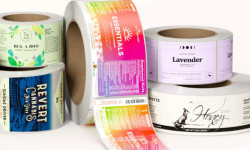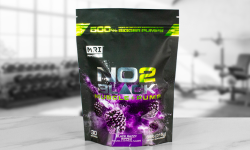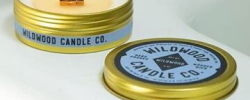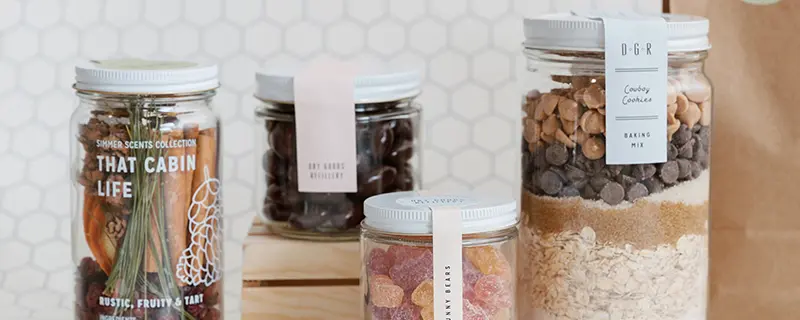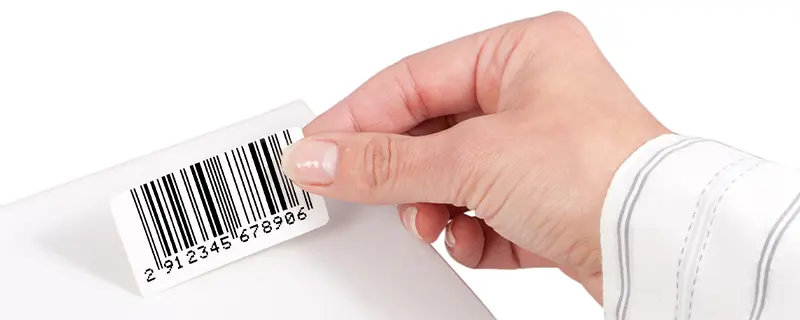Labels by the roll are printed using high-speed, automated processes that ensure consistent quality and durability. They are typically produced using methods like flexographic or digital printing, allowing for large quantities to be printed efficiently and wound onto rolls for easy application.
This makes them ideal for high-volume production, automated labeling systems, and industries that require durable and professional labels.
Now that we’ve covered the basics, let’s break down the process, uses, benefits, and how to get the most out of your custom labels by the roll.

How Are Labels by the Roll Printed?
The printing process for labels by the roll follows these key steps:
1. Design Preparation
Start by creating a label design that matches your branding and product requirements. The design file should be high resolution and include all necessary information like logos, product names, and other details.
2. Material Selection
Choosing the right material is crucial. Options include:
- BOPP (Biaxially Oriented Polypropylene) - Highly durable, water-resistant, and great for products exposed to moisture.
- Paper Labels - Cost-effective and suitable for dry environments.
- Metallic Labels - Adds a touch of elegance and shine, perfect for luxury items.
- Estate Paper Labels - Offer a premium, textured look that’s perfect for high-end products like spirits or artisanal goods. They give a classic, sophisticated feel but may require lamination for added durability.
3. Printing Methods
The most common printing techniques for roll labels include:
- Flexographic Printing - Uses flexible plates to print large volumes quickly and efficiently.
- Digital Printing - Best for smaller runs and offers vibrant colors and sharp details.

4. Finishing Touches
Enhance your labels with:
- Lamination - Protects against water, oil, and UV exposure.
- Embossing - Adds texture and a premium feel.
- Foil Stamping - Creates metallic accents that catch the eye.
5. Die-Cutting and Rewinding
Labels are die-cut to their specified shape and then rewound onto rolls for easy application. This step also includes quality checks to ensure every label is printed correctly and aligned properly.
Why Use Labels by the Roll?
Using labels by the roll offers numerous benefits, especially for businesses needing efficiency and quality.
1. Efficiency
Roll labels are designed to work seamlessly with automated labeling machines, which makes them ideal for large production runs. They are also easy to dispense and apply, saving both time and labor.
2. Versatility
Whether you need custom labels by the roll for bottles, jars, or boxes, the flexibility in size, shape, and finish makes them suitable for nearly any product.
3. Cost-Effectiveness
Printing in large volumes lowers the cost per label, making it an economical choice for businesses with high labeling demands.
4. Professional Appearance
With options for custom printed roll labels and specialized finishes, your products will stand out on the shelf and withstand handling without fading or peeling.

Common Uses for Roll Labels
Labels by the roll are incredibly versatile and used across various industries. Here are some of the most common applications:
- Product Labels - Ideal for food, beverages, cosmetics, and more.
- Shipping Labels - Perfect for logistics and inventory management.
- Promotional Stickers - Great for branding and giveaways.
- Warning and Safety Labels - Used in industrial settings for equipment and safety compliance.
Materials That Make a Difference
Choosing the right material for your custom roll labels is essential for maintaining quality and durability. Here are some top choices:
- BOPP Labels - Highly resistant to moisture, oils, and chemicals, making them ideal for food and beverage products.
- Textured Paper Labels - Give a rustic, craft feel but require lamination for moisture protection.
- Clear Film Labels - Provide a sleek, no-label look while maintaining durability.
- Gloss or Matte Finishes - Enhance the appearance while protecting the print from wear and tear.
Tips for Designing Custom Roll Labels
- Keep It Simple - Clear, concise text and minimal clutter make labels more readable.
- Use High-Contrast Colors - Ensure the text stands out from the background.
- Incorporate Branding Elements - Logos, fonts, and color schemes should match your brand identity.
- Test for Durability - Use scratch tests and exposure tests to ensure longevity.
Are Roll Labels Right for You?
If you need reliable, cost-effective labeling with customization options, custom labels by the roll are the way to go. They work well for both small businesses and large-scale manufacturers, offering durability and a professional appearance.
Looking to get the best quality for your project? Check out our custom whiskey bottle labels to make your products stand out with durability and great design.
